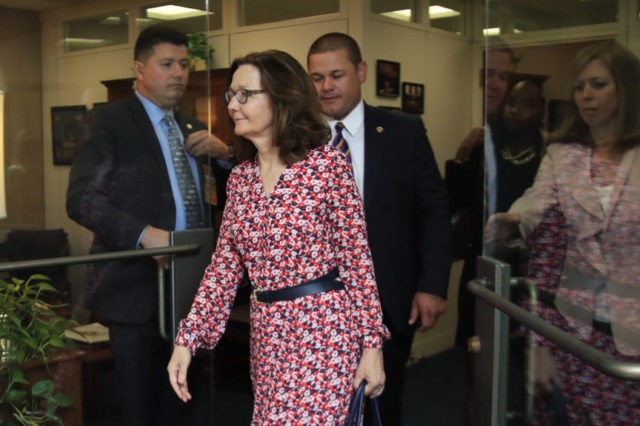WASHINGTON (AP) — The fate of President Donald Trump’s CIA nominee hinges on how well she fields tough questions Wednesday from senators who want details of her time running a covert detention site where terror suspects were brutally interrogated after 9/11 and an explanation for why she wanted videos of the sessions destroyed.
Gina Haspel, a 61-year-old career undercover spy who is currently acting CIA director, has been practicing her answers at mock confirmation hearings with former top intelligence officials. Many of them praise her 33-year tenure at the agency in foreign and domestic assignments, and she received glowing endorsements from Republican senators on the eve of the hearing.
“I know that some have requested the documents that deal with covert action be made public and declassified,” Sen. Richard Burr of North Carolina, the Republican chairman of the Senate Intelligence Committee, said Tuesday. “That has never happened in the history of the CIA, and it’s not going to happen with Gina Haspel’s nomination.”
His GOP colleague on the committee, Sen. John Cornyn of Texas, lamented how Haspel’s nomination fueled a “toxic political environment.” He said Democrats and other opponents have engaged in “character assassination” before giving her the opportunity to answer questions and defend herself.
Democrats have complained repeatedly that the CIA has failed to declassify enough information on her career, leaving the public in the dark about the person who might end up leading the CIA.
Sen. Ron Wyden, D-Ore., and three of his Democratic colleagues recently wrote a letter to Dan Coats, the director of national intelligence, asking that his office, which oversees all U.S. intelligence agencies, declassify the documents that the CIA has declined to declassify. He cited a provision of an executive order that prohibits information from being classified “in order to conceal violations of law, inefficiency or administrative error” or “to prevent embarrassment to a person, organization or agency.”
“This is really a high-stakes hearing,” Wyden said. He warned it would set a damaging precedent “if this administration is allowed to get away with what I consider to be a secret confirmation” for the most visible official in U.S. intelligence.
It’s unclear when the committee will vote on Haspel’s nomination. After that, it will go to the full Senate for a vote. Without Sen. John McCain of Arizona, who is battling brain cancer, the Republicans hold a 50-49 majority in the Senate. Most Republicans, except Sen. Rand Paul of Kentucky, are expected to vote for Haspel, but she would need at least one Democratic vote to be confirmed. Vice President Mike Pence, as president of the Senate, can be called on to break a tie vote.
Senate Minority Leader Chuck Schumer, D-.N.Y., said Tuesday that he is waiting to hear Haspel’s comments at the hearing before making up his mind.
“I think that’s true for just about all of our caucus,” he said.
Sen. Dick Durbin, D-Ill., wrote a letter on Tuesday to Coats to question whether it was appropriate for the CIA to wage a robust public relations campaign for Haspel on the taxpayer’s dime.
As the hearing neared, Haspel’s critics outside Congress stepped up their opposition, arguing that anyone who willingly participated in one of the CIA’s darkest chapters should not be at the helm of the spy agency. They argue that having Haspel as the face of U.S. intelligence will undercut America’s effort to champion human rights.
Robert Ford, former U.S. ambassador to Syria and fellow at the Middle East Institute in Washington, said that while U.S. military personnel had been punished for human rights abuses such as at Abu Ghraib prison in Iraq, few intelligence professionals were reprimanded for their activities with the detention and interrogation program that had been approved by the White House and reviewed and approved by the Justice Department.
A confirmation of Haspel would be interpreted overseas as implicit approval of a program of harsh detention and interrogation, Ford said.
Ali Soufan, a former FBI agent who interrogated high-value terror detainees, said he has concerns about how Haspel drafted a cable ordering the destruction of 92 videotapes made at the Thailand site. Haspel’s boss, Jose Rodriguez, actually dispatched the order in 2005 to have the tapes shredded.
Soufan, who now heads a private risk-assessment firm, asked whether Haspel wanted them destroyed to protect the identities of CIA personnel who worked there or because they would discredit the agency.
Last month, the CIA released a memo showing Haspel was cleared of wrongdoing in the destruction of the videotapes. The memo, written in 2011, summarizes a disciplinary review conducted by then-CIA Deputy Director Mike Morell. He said that while Haspel was one of the two officers “directly involved in the decision to destroy the tapes,” he “found no fault” with what she did.

COMMENTS
Please let us know if you're having issues with commenting.